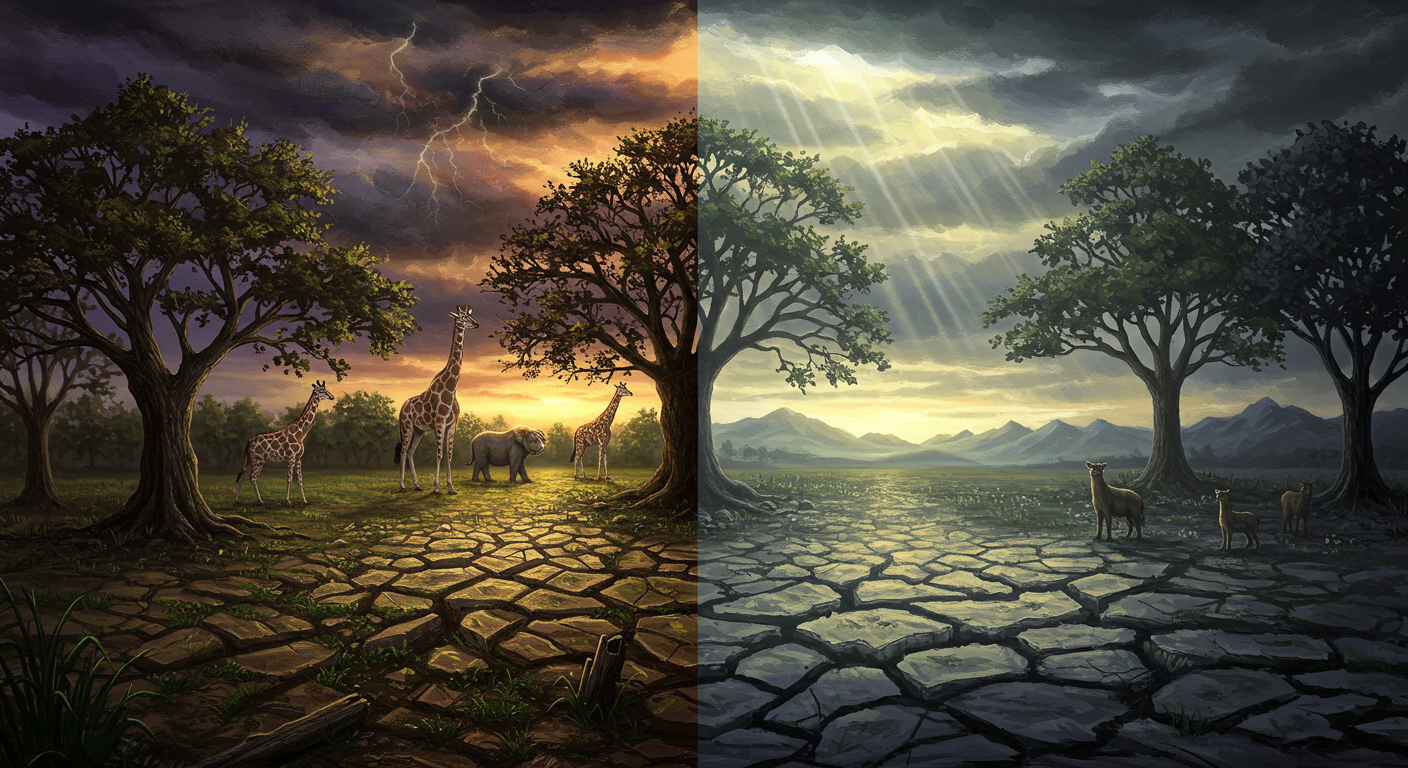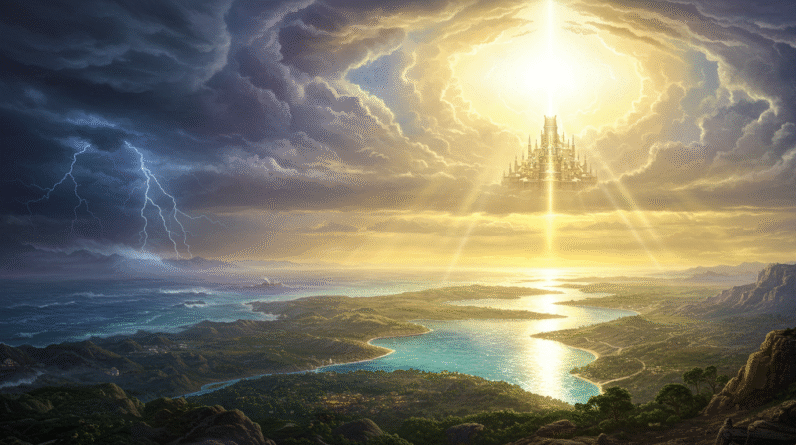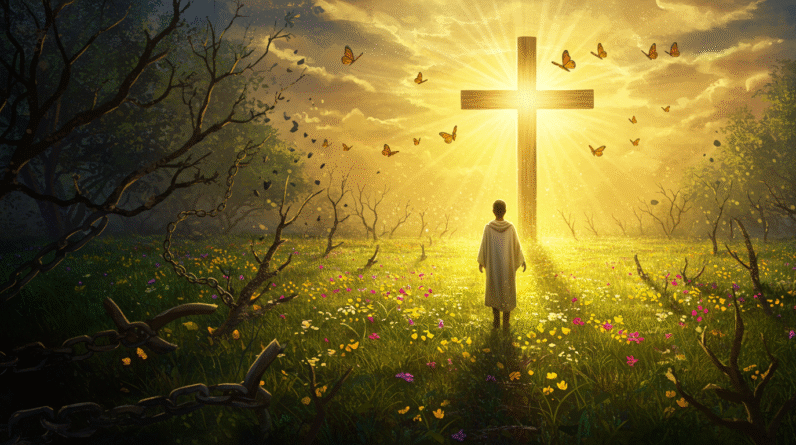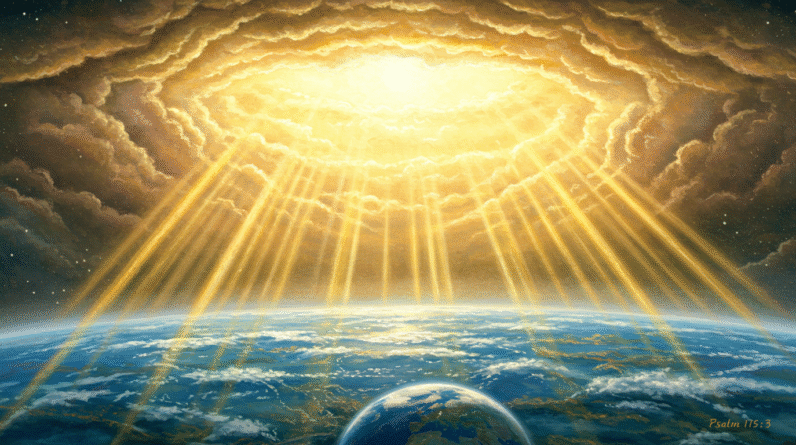The Fall And Creation’s Groaning (Romans 8:19–21)
You come to Romans 8 and find a passage that pulls at the heart of both theology and everyday life: creation is waiting, longing, and groaning. Paul writes not just about personal salvation, but about a cosmos that is not the way God intended it to be. In these verses, he teaches you that the Fall has consequences that reach beyond human souls into the very fabric of the world God made. This is not an abstract doctrine; it’s a truth that touches your daily life — the weather that ruins your plans, the diseases that afflict loved ones, the ecological ruins you see in the news. Paul’s words are designed to awaken you to a larger, cosmic hope and to remind you of God’s ultimate plan to restore all things.
Reading Romans 8:19–21
Read Paul’s words slowly and let them settle over you: Romans 8:19–21. He speaks of creation “eagerly waits” for the revealing of the sons of God, of creation being subjected to frustration, and of the hope that it will be liberated from bondage to decay. When you read that, you should feel both the weight of the Fall and the promise of redemption. These verses locate you within a drama that began in Eden and will end in a new creation. The language is prophetic and pastoral at once — it comforts and it convicts. It tells you that what God will do for humanity He intends to do for the whole creation, and that you are invited into this unfolding story.
The Immediate Context in Paul’s Letter
To understand these verses, you must situate them in Paul’s wider argument. Romans is a book about sin, grace, and God’s righteousness. Earlier, Paul explains how sin entered the world through one man and how dying and death came as a result (Romans 5:12). Having explained humanity’s plight and the work of Christ, Paul moves to the results: life in the Spirit, freedom from condemnation, and now, creation’s groaning. When you hold these sections together, you see a single, sweeping purpose: God sets loose the forces of redemption that will not only save your soul but will ultimately reclaim the whole of created reality. Paul’s pastoral concern is to anchor your hope in God’s promise, so that you will not despair even in the face of suffering.
What Paul Means by “Creation”
When Paul speaks of “creation” (the Greek word ktisis), he has in view the created order itself — the non-human world, the material cosmos that God pronounced good in Genesis. He is not restricting the term to a scientific notion but is speaking the biblical language of the world God lovingly fashioned. When you read Romans 8:19–21 you should imagine the hills and valleys, beasts and birds, oceans and stars — all of them placed under a kind of tension since the Fall. This is not a distant theology; it is the recognition that the very order God made now reflects the brokenness of human rebellion. Paul’s theology insists that the created order is not incidental to God’s plan but central to His redemptive design.
The Groaning of Creation
Paul brings a poignant image when he writes that creation “groans” and “travails” together in childbirth (Romans 8:22). That metaphor captures both pain and hope. You feel the ache of the present — the disasters, the suffering, the ecological degradation — and you also hear the whisper of promise: new birth is coming. The groaning is not senseless; it is purposeful. It is part of the gestation of God’s promised renewal. When you see the groaning around you, you should not conclude that God is absent. Instead, you should hear that God is at work, even now, forming a new reality out of the wreckage of the old.
How the Fall Affects Creation
To see how creation groans, you must return to the first fall. Read the curse pronounced after Adam’s disobedience: Genesis 3:17-19. The ground was cursed; toil became part of human life; the harmony between humanity and the earth was disrupted. The Fall introduced decay, frustration, and corruption into the created order. Everything that was designed to serve humanity in partnership with God became subject to slowness, resistance, and death. When you consider this, the brokenness in the world — the famine, disease, and natural hurdles — begins to make theological sense. They are not arbitrary but symptomatic of a deeper disordered relationship between God, humanity, and the rest of creation.
Creation’s Subjection to Futility
Paul declares that creation was subjected to “frustration” or “futility” not by its own choice but by the will of the One who subjected it (Romans 8:20. That turns your attention to God’s purpose, even in subjection. For you, this is humbling: the world you live in is not merely broken because of random forces or purely naturalistic processes; it is broken as a consequence of human rebellion, and yet God’s allowing of this state has a purpose toward future good. Paul teaches that God’s present allowance of subjection will result in the liberation and glorification of creation. You should see in this both mystery and mercy: God permits the groaning for a season to achieve a more glorious redesign.
The Hope of Redemption for Creation
Paul does not end with the Fall. He places hope at the center of his message: creation will be liberated from bondage to decay and will share in the freedom and glory of the children of God (Romans 8:21). This is a cosmic promise. You are given to understand that Christ’s redemption is not merely spiritual and otherworldly, but cosmic and transformative. Paul’s vision maps onto the biblical raft of hope that ends history with restoration — the resurrection not only of human bodies but the renewal of the entire creation. The picture is not a faint ethical superstructure but a robust assurance: what God has begun in you, He plans to complete in the whole of creation.
Creation and the Work of Christ
You should connect Paul’s hope with the work of Christ in Scripture as a whole. Christ is the agent through whom God restores all things: “For in him all things were created … in him all things hold together” (Colossians 1:16-17). Paul’s theology of the cosmic Christ informs Romans: God’s Son is not simply a Savior of individual souls but the Lord of the universe, whose reconciling work extends to every square inch of creation. When you grasp this, your faith becomes both more personal and more expansive. The cross and resurrection are the hinge on which history turns, and everything God made is linked to that hinge.
New Creation: The Promised Renewal
Scripture culminates in the promise of a new heaven and a new earth where former things pass away and God dwells with His people (Revelation 21:1–5). This is the fulfillment toward which creation groans. Paul’s language in Romans 8 fits inside this eschatological hope: the groaning and travail of creation are the birth-pangs of a better age to come. For you, this means that the suffering of today is temporary and purposeful, and that the final word belongs to God’s restorative love. The Bible does not give you a cheap optimism but a sure, covenantal hope grounded in God’s promises and demonstrated in Christ.
God as Creator Throughout Scripture
The theme of God as Creator is woven through Scripture, and it anchors the hope that creation will be restored. Begin at the beginning: Genesis 1:1 declares God’s creative sovereignty. The psalmist proclaims the glory of God displayed in the heavens: Psalm 19:1. Isaiah reminds you that God did not create the earth to be empty, but formed it with purpose: Isaiah 45:18. These texts form a consistent line: God is Creator, and creation is His purposeful work. When you view Romans in that light, Paul’s declaration about creation’s groaning and hope becomes a continuation of Scripture’s grand narrative about God’s purposeful rule over all things.
The Groaning and Human Hope
When creation groans, you should feel solidarity between your suffering and creation’s suffering. Paul tells you that not only creation but also you — the children of God — groan inwardly as you await adoption, redemption of your bodies, and the fulfillment of your hope (Romans 8:23). There is a shared longing: the whole cosmos and God’s people yearn for the consummation of God’s promises. This shared groaning invites empathy and patience. It helps you bear one another’s burdens and strengthens your resolve to live faithfully in this time of waiting. It is a community of hope, bound by a shared expectation that God will fulfill His promises.
A symbolic biblical illustration showing creation under the weight of the Fall. A once-beautiful garden now shows signs of decay—trees with both flourishing leaves and withered branches, animals looking upward with longing, and the earth cracked yet glowing faintly with hope. Above, the sky is divided: one side dark and stormy, symbolizing groaning and bondage, the other side glowing with light, symbolizing future glory and freedom. The atmosphere conveys both sorrow and anticipation, inspired by Romans 8:19–21: “Creation waits in eager expectation… that it will be liberated from its bondage to decay.”

Practical Implications: How You Live in a Groaning World
What does this theology mean for your daily walk? First, it calls you to be a steward of creation, not an exploiter. If the world is God’s good handiwork and destined for restoration, then your actions toward the environment matter. Second, it calls you to compassion: the suffering you see — from natural disasters to human poverty — is not indifferent to God; it calls for your hands and prayers. Third, it shapes your perspective on suffering: rather than despairing, you should grieve rightly and act faithfully, knowing that God turns suffering into hope. You will find in Paul’s teaching a motivation to care for the earth, to pursue justice for the poor, and to live with eschatological patience, confident that your small acts of righteousness participate in God’s larger redemptive work.
Stewardship and Care for Creation
Faithful Christian living in a groaning world includes stewardship of the environment. You should take seriously that the earth is entrusted to human care, even though that trust was broken in the Fall. Reclaiming that trust means tending gardens, reducing waste, advocating for the vulnerable who suffer most from environmental degradation, and supporting policies that protect God’s handiwork. Your small decisions about consumption, travel, and community engagement are moral choices shaped by the knowledge that God intends to restore His creation. The Gospel does not separate spiritual renewal from physical responsibility; it binds them together in the work of reconciliation and restoration.
The Gospel as the Catalyst for Cosmic Restoration
The good news you hold is not merely about a ticket to heaven; it is the announcement of a Creator who will make all things new. Christ’s reconciling work extends to every realm, according to Scripture (Colossians 1:19–20). The same power that raised Jesus from the dead is at work to renew the cosmos. If you have trusted Christ, then you are not only a beneficiary but also an agent of this restoration, called to reflect God’s love and to participate in healing. You are commissioned to proclaim a Gospel that includes both people and planet, and to do so with the urgency of one who knows the groaning will one day cease.
Why Creation Groans: A Theological Reflection
You may wonder why a good God allows creation to groan. The Bible gives several overlapping reasons: the intrusion of sin disrupted God’s good order; the present age awaits consummation; and God, in His sovereignty, permits a season of testing and growth for greater glory. Paul says that creation was subjected to frustration, not willingly, but for the hope set before it (Romans 8:20–21). That means the groaning serves a divine pedagogical purpose; it fosters patience, deepens longing, and illuminates the urgent need for God’s saving work. It invites you into a theology of hope that is simultaneously honest about pain and resolute in expectation.
Christ the Firstfruits and the Future Glory
Paul gives you assurance that the end is not uncertain: Christ is the firstfruits of those who have fallen asleep ([1 Corinthians 15:20] — for reference see Romans 8:29–30). His resurrection is the guarantee that what He accomplished applies to the whole creation. God’s redemptive plan moves from Christ’s victory to the eventual renewal of every created thing. For you, this guarantees that the groans are not the final note of the story. The resurrection begins the restoration, and you live now in the tension of “already” and “not yet” — already redeemed in spirit, not yet fully redeemed in body or cosmos. This tension invites you to faithfulness and perseverance.
The Role of Prayer and Worship
You should not underestimate the power of prayer and worship in this groaning world. Scripture models a people who bring the cries of creation and humanity before God. The psalmist praises God for His creative works (Psalm 8:3–8) and calls believers to trust in His providence. Prayer aligns your heart with God’s purposes, and worship reminds you of God’s sovereignty in the midst of pain. When you pray for healing, for creation, for justice, you participate in the redemptive movement of God. Prayer is not a passive resignation; it is an active partnership with the God who is bringing about the renewal of all things.
Living Hope: Patiently Awaiting God’s Promise
Finally, Paul commands you to hold fast to hope. The Scriptures are replete with promises of God’s future restoration: God will swallow up death forever, He will wipe away every tear, and He will make all things new (Revelation 21:1–5). Your patient waiting is not idleness. It is the posture of those who know the Author of history. The hope to which you cling transforms how you see suffering and how you respond to the groaning around you. It makes your life an expression of trust and deeds of mercy to the world that God loves.
A Personal Appeal: Responding to God’s Cosmic Plan
If you are reading this and you have not placed your trust in Christ, let this be an earnest appeal. The restoration Paul promises is centered in the person and work of Jesus Christ. Scripture invites you to repent and believe: God offers forgiveness and restoration through Christ (John 3:16). To embrace Him is to enter into God’s family and to become part of the community that God uses to steward and pray for creation. If you have already trusted Christ, hear the call to live in hopeful obedience, caring for God’s world and loving your neighbor. Either way, the gospel is the pivot from which all hope for you and for creation flows.
Conclusion: Hope, Stewardship, and the Ultimate Restoration
As you reflect on Romans 8:19–21, remember that creation’s groaning is both a lament and a promise. It tells you that the world is not as it should be and that God will act to set it right. Your role is to live in the tension: to grieve where there is sorrow, to act where there is need, to pray where there is helplessness, and to witness where there is darkness. Hold fast to the Creator who made the world good, who permitted a season of groaning, and who promises a glorious restoration. Let that hope shape your vision, your priorities, and your life.
Explore More
For further reading and encouragement, check out these posts:
👉 7 Bible Verses About Faith in Hard Times
👉 Job’s Faith: What We Can Learn From His Trials
👉 How To Trust God When Everything Falls Apart
👉 Why God Allows Suffering – A Biblical Perspective
👉 Faith Over Fear: How To Stand Strong In Uncertain Seasons
👉 How To Encourage Someone Struggling With Their Faith
👉 5 Prayers for Strength When You’re Feeling Weak

📘 Jesus and the Woman Caught in Adultery – Grace and Mercy Over Judgement
A powerful retelling of John 8:1-11. This book brings to life the depth of forgiveness, mercy, and God’s unwavering love.
👉 Check it now on Amazon
As a ClickBank & Amazon Affiliate, I earn from qualifying purchases.
Acknowledgment: All Bible verses referenced in this article were accessed via Bible Gateway (or Bible Hub).
“Want to explore more? Check out our latest post on Why Jesus? and discover the life-changing truth of the Gospel!”








